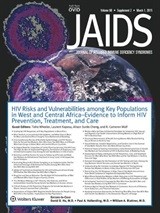
For Immediate Release
Accra, Ghana – The U.S. Government, acting through the United States Agency for International Development (USAID), in partnership with the Johns Hopkins University Center for AIDS Research, the Foundation for AIDS Research, and the National Institutes of Health, announces the release of a special issue of the Journal of Acquired Immune Deficiency Syndromes (JAIDS) titled “HIV Risks and Vulnerabilities among Key Populations in West and Central Africa—Evidence to Inform HIV Prevention, Treatment, and Care.”
Over 6.5 million people live with HIV in West and Central Africa, a region that spans 24 countries and has a population of over 350 million people. This amounts to an average HIV prevalence rate of 4.9 percent in the general population. However, in West Africa the prevalence is 19 to 30 times higher among key populations—a term for populations known to be at greater risk of infection—including female sex workers and their clients, men who have sex with men, and people who inject drugs. Until now, limited data has been an obstacle to fully understanding the dynamics of HIV transmission related to these high-risk populations in the region and the kind of programming needed to address this.
To fill this gap, USAID, with funding from the President’s Emergency Plan for AIDS Relief, provided technical and financial assistance for this special JAIDS issue, which features 23 articles characterizing risks, vulnerabilities, and HIV prevention and treatment opportunities among the key populations. The articles present data from 11 different countries in the region, and include a wide range of analyses that use mathematical modeling, epidemiologic studies, qualitative studies, cost-effectiveness assessments and policy assessments. The special JAIDS issue will be available free online as of March 3, 2015 at the following link: http://journals.lww.com/jaids/toc/2015/03011.







Comment
Make a general inquiry or suggest an improvement.